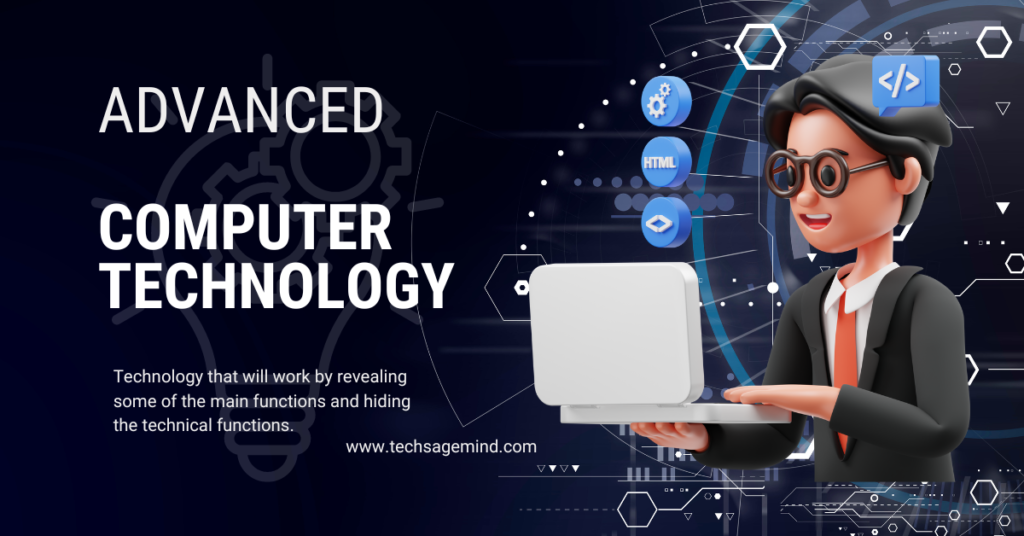The world of computer technology is an ever-evolving landscape, constantly pushing the boundaries of what’s possible. Beyond the familiar territory of laptops and smartphones lies a fascinating world of advanced computer technology promising to revolutionize fields ranging from medicine and materials science to artificial intelligence and beyond. Let’s embark on a journey through this intricate web, exploring the groundbreaking innovations shaping the future of computing.
This article delves into some of the most fascinating and impactful advanced computer technologies currently shaping the future.
- Quantum Computing: Unleashing the Power of the Quantum World
Classical computers rely on bits, which can be either 0 or 1. Quantum computers, however, leverage qubits, which can exist in a state of superposition, representing both 0 and 1 simultaneously. This allows them to perform complex calculations exponentially faster than classical computers, potentially revolutionizing fields like drug discovery, materials science, and financial modeling. While still in its early stages, quantum computing holds immense promise for tackling previously unsolvable problems.
- Neuromorphic Computing: Mimicking the Brain for Efficiency and Intelligence
Inspired by the human brain’s structure and function, neuromorphic computing aims to create computers that process information in a similar way. These systems utilize artificial neurons and synapses to perform tasks like pattern recognition and machine learning more efficiently than conventional processors. This technology has the potential to power self-driving cars, intelligent robots, and advanced AI applications, ultimately leading to more human-like computing systems.
- Edge Computing: Bringing Processing Power Closer to the Source
Traditional cloud computing centralizes data and processing power in large data centers. However, edge computing pushes processing closer to the source of data, such as sensors, devices, and machines. This allows for faster response times, reduced latency, and improved efficiency for applications like the Internet of Things (IoT) and autonomous systems. Edge computing is crucial for real-time applications requiring low latency, like industrial automation and smart cities.
- Blockchain: Building Trust and Transparency in a Digital World
Blockchain is a distributed ledger technology that securely stores and verifies data in a decentralized manner. This eliminates the need for a central authority, fostering transparency and trust in online transactions. Blockchain has applications in various domains, including supply chain management, secure voting systems, and digital asset management. Its potential to revolutionize how we interact and exchange data online is immense.
- Artificial Intelligence and Machine Learning: Empowering Machines to Learn and Adapt
Artificial intelligence (AI) and machine learning (ML) are rapidly evolving, enabling machines to learn and adapt based on data. These technologies are already transforming industries like healthcare, finance, and manufacturing. AI-powered systems can diagnose diseases, personalize learning experiences, and optimize business operations. As these technologies develop further, their impact will be felt across all aspects of our lives.
- Human-Computer Interaction: Bridging the Gap between Humans and Machines
As computers become more sophisticated, the way we interact with them needs to evolve. Human-computer interaction (HCI) research focuses on creating natural and intuitive interfaces that bridge the gap between humans and machines. This includes advancements in voice recognition, gesture control, and augmented reality, leading to more seamless and immersive interactions with technology.
- Cybersecurity: Protecting Our Digital World in a Constantly Evolving Landscape
With increasing reliance on technology, cybersecurity becomes ever more critical. Advanced computer technologies like AI and blockchain are being utilized not only to enhance security but also to create new threats. Secure hardware architectures, robust encryption methods, and continuous threat detection are crucial to safeguarding our digital infrastructure from cyberattacks.
- Responsible Development and Ethical Considerations:
While advanced computer technologies offer immense potential, their development and deployment must be guided by ethical considerations. Issues like privacy, bias, and job displacement need careful attention. Responsible development and transparent discussions are essential to ensuring these technologies benefit society as a whole.
The Future of Advanced Computer Technology:
The field of advanced computer technology is constantly evolving, with new breakthroughs happening at an ever-increasing pace. These advancements hold the potential to revolutionize various aspects of our lives, from how we work and interact with each other to how we understand the world around us. However, it’s crucial to approach these technologies responsibly, considering their ethical implications and ensuring they serve humanity’s best interests. As we move forward, it’s our responsibility to shape the future of technology and ensure it benefits everyone.
Remember:
This article provides a brief overview of several exciting advancements in advanced computer technology. Each technology deserves a deeper dive, and further exploration is encouraged to gain a more nuanced understanding of their potential and challenges.
Note:
The future of technology is in our hands. Let’s embrace innovation responsibly and work towards a future where technology empowers us all.
Building a Future for All:
While advanced computer technology promises remarkable breakthroughs, ensuring equitable access and responsible development is crucial. Bridging the digital divide requires initiatives to increase the accessibility and affordability of technology. Furthermore, ethical considerations, data privacy regulations, and responsible AI development are paramount to mitigating potential risks and ensuring technology benefits all aspects of society.
In conclusion:
The landscape of advanced computer technology is bursting with possibilities. From harnessing the power of quantum mechanics to blurring the lines between physical and digital, these innovations promise to transform our world. As we navigate this exciting frontier, responsible development, accessibility, and ethical considerations must guide our path, ensuring technology empowers a brighter future for all.
Note:
This article provides a glimpse into the vast and multifaceted world of advanced computer technology. Each area mentioned deserves further exploration, and this piece serves as a springboard for further inquiry and engagement.
FAQ’s:
- How do I use quantum computing in my daily life?
Quantum computing is still an emerging technology, but it has the potential to revolutionize fields like medicine, finance, and climate modeling. While it’s not yet directly applicable to daily life, it will likely impact various industries and improve overall efficiency.
- How does neuromorphic computing apply to my smartphone?
Neuromorphic computing is being explored for potential applications in smartphones, enabling features like enhanced voice recognition, personalized AI assistants, and more efficient processing.
- What is edge computing, and how does it affect my smart home devices?
Edge computing reduces latency and improves efficiency for applications like IoT and autonomous systems. This means faster response times and more seamless interactions with your smart home devices.
- How does blockchain technology secure my online transactions?
Blockchain technology provides a decentralized and secure way to store and verify data, ensuring that your online transactions are protected from fraud and cyber threats.
- How do AI and ML impact my daily life?
AI and ML are already transforming industries like healthcare, finance, and manufacturing. You may encounter AI-powered chatbots, personalized product recommendations, and more efficient services.
- What is HCI, and how does it improve my user experience?
HCI focuses on creating natural and intuitive interfaces between humans and machines. This leads to more user-friendly devices, apps, and software, making it easier to interact with technology.
- Why is cybersecurity essential for my devices and online presence?
Cybersecurity protects your digital world from threats and attacks, safeguarding your personal data and ensuring a secure online experience.
- What are the ethical considerations surrounding advanced computer technology?
Ethical considerations include privacy, bias, and job displacement. It’s crucial to address these issues to ensure that technology benefits society as a whole.
- How can I contribute to responsible development and deployment of advanced computer technologies?
You can stay informed, engage in discussions, and support initiatives promoting ethical considerations, accessibility, and affordability.
- What does the future of advanced computer technology hold?
The future holds immense potential for breakthroughs and transformations. With responsible development and deployment, advanced computer technology can lead to a brighter future for all.




